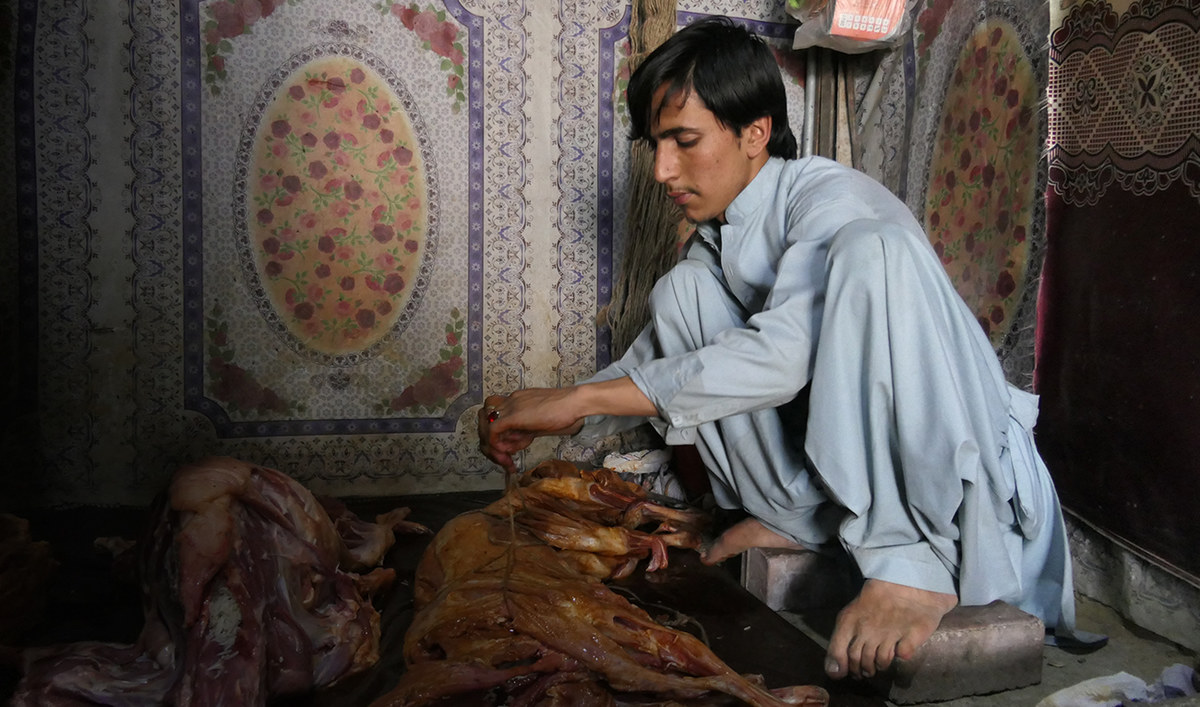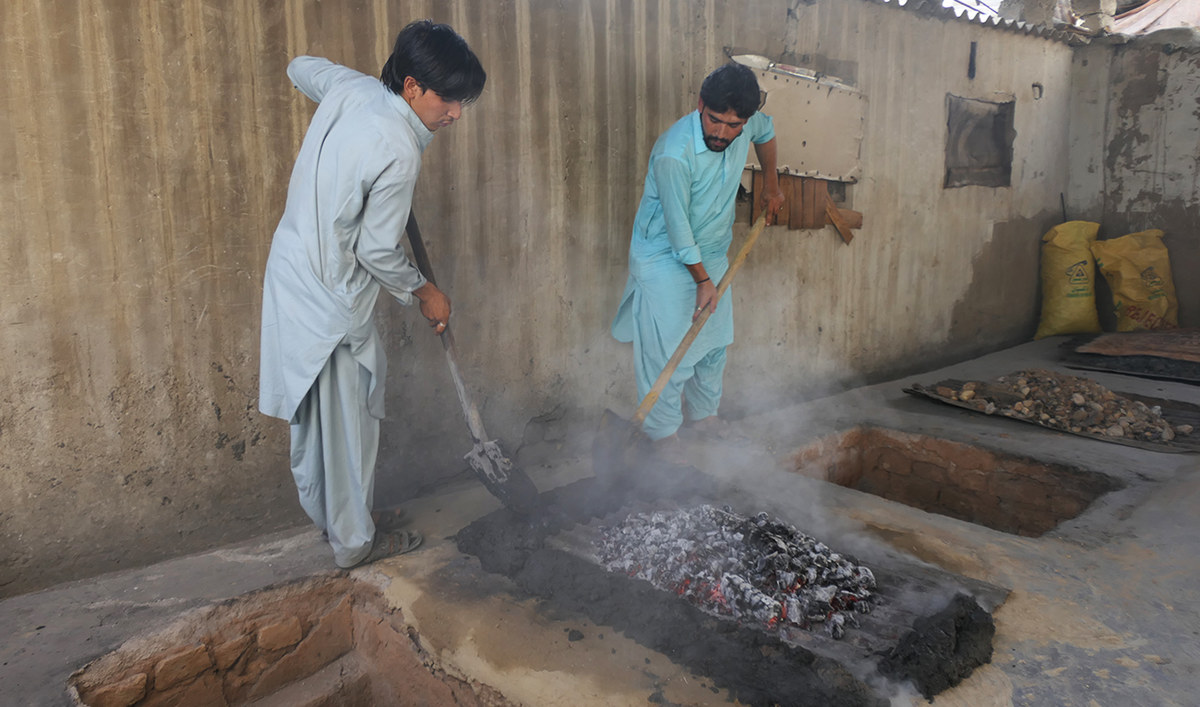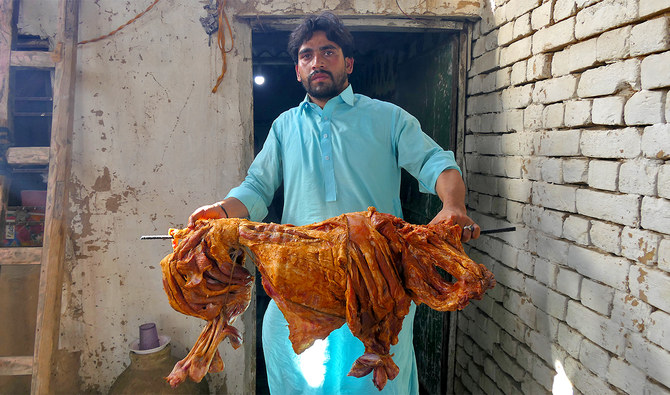QUETTA: Fazal Muhammad shoveled platefuls of rice mixed with almonds and cashews inside the belly of a goat marinated for three hours at his shop in Quetta’s Nawa Killi area. He then sewed the stomach shut and skewered the goat before carefully lowering it into a hole in the ground, above a layer of fiery hot coals. He then covered the underground oven with a metal sheet, place more hot coals on it, and stood back. All he had to do now was wait for three hours.
Balochistan, Pakistan’s largest province in terms of land, is celebrated for its authentic and mouthwatering meat-based dishes. Among them, Khadi Kabab – a delectable meat cooked in a coal-fired pit – stands out as one of the country’s cherished culinary traditions, attracting food enthusiasts from Punjab, Sindh, and Khyber Pakhtunkhwa provinces.
Having inherited the art of making the dish from his father, Abdul Hanan, who opened his shop in 1993 in Quetta’s Chashma Chuzai area, Muhammad’s establishment has become a household name for the province’s most enticing traditional cuisine.
“Khadi Kabab is our delicious and traditional food that people love because of its juicy taste,” he said in a conversation with Arab News. “The Pashtun tribesmen love lamb’s Khadi Kabab, but the Baloch and other nations bring goats to be cooked in the coal-filled oven.”

A chef stuffs the lamb’s belly with rice in Quetta, Pakistan, on July 10, 2023. (AN Photo)
Muhammad said what made the dish special and gave it a unique taste was its preparation method.
“Khadi Kabab cannot be prepared outside the pit or on fire,” he explained. “Hence, we have dug out these pits inside the shop to maintain the taste of the lamb and goat meat since it needs to be cooked on the slow heat of the coal for about three hours which is about four feet beneath.”

Fazal Muhammad prepares the pit with a layer of embers to cook Khadi Kabab at a local shop in Quetta, Pakistan, on July 11, 2023. (AN photo)
Today, Quetta boasts over 12 Khadi Kabab shops, each with its own special blend of spices. Nevertheless, some customers prefer to savor the natural flavors by only adding salt to their meaty delights.
“We add our own special spice, which blends garlic, ginger, red chilli, and vinegar, to enhance the taste of the meat,” Muhammad said while sharing the intricacies of Khadi Kabab’s preparation with Arab News.
“After adding the spice deep inside the meat, we place the embers inside the pit and allow the lamb and goat to cook slowly. We cover the pit with a sealed lid made of mud and add more embers on top.”

The picture taken on July 10, 2023, shows cooked Khadi Kabab inside an ember pit in Quetta, Pakistan, on July 10, 2023. (AN Photo)
Muslims around the world celebrated Eid Al-Adha, a festive occasion filled with dining and gatherings featuring an array of delectable dishes, in the late week of June. However, in Balochistan, many tribesmen still flock to Khadi Kabab shops, bringing their sacrificial animals to be cooked in underground coal ovens.
Among the popular choices is the rice-stuffed Khadi Kabab, where rice filled with raisins, cashews, and almonds is cooked inside the lamb’s belly and skillfully secured with a rope, delivering an authentic and delightful taste.
One such customer, Iqbal Shah, brought a lamb nearly 12 days after Eid Al-Adha to the Khadi Kabab shop.
“People of Balochistan like lamb and goat meat because of the way it is cooked, which is quite unique and cannot be found in any other Pakistani province,” he told Arab News. “After being cooked inside the ember-filled pit, the meat and bones become very soft and tender.”

Fazal Muhammad seals the pit with mud and coals to cook the stuffed lamb at a shop in Quetta, Pakistan, on July 11, 2023. (AN photo)
Shah said he planned a separate Khadi Kabab gathering for his family after Eid, emphasizing that the cuisine should be cherished on its own, without the accompaniment of other dishes, due to its substantial nature.
For the preparation of a lamb stuffed with rice, the Khadi Kabab makers charge Rs4,500 ($16.09). However, a rice-free option is also available for Rs3,500 ($12.51). To accommodate those unable to afford an entire lamb, the shops also serve customers who only bring shoulder pieces to them.
Muhammad Imran Hameed, another resident of Quetta, invited his friends to his home for a party where Khadi Kabab was savored. He said the dish was ideal for large gatherings since it allowed meat lovers to indulge in this exceptional and flavorful delicacy.
“It has a unique taste because of the slow heat of the coal,” he told Arab News. “It should be eaten quickly after being taken out of the pit because Khadi Kabab turns hard as it gets cold.”
As night falls and the activities at Muhammad’s shop wind down, he removed the lid from the pit and unveiled the carefully cooked meat before handing it over to his eager customers.
“The majority of my customers place their orders in winter, but Eid Al-Adha arrived in summer this year, and I even received orders during this season,” he said, adding that he prepared over a hundred Khadi Kababs during the three days of Eid.
















